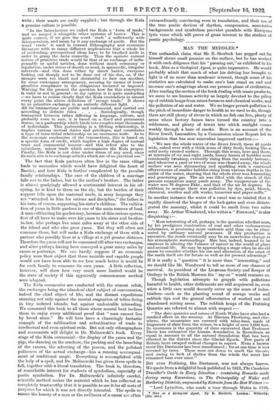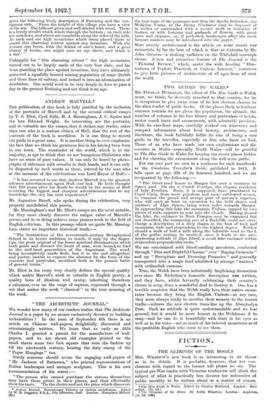MAN THE MEDDLER*
THE outlandish claim that Mr. R. Sherlock has pegged out for himself shows small promise on the surface, but he has worked it with such diligence that his "panning out," as exhibited in his book, Man as a Geological Agent, is quite impressive. He would probably admit that much of what his delving has brought to light is of no more than academic interest, though some of his statistics are calculated to make one's hair stand on end and increase one's misgivings about our present phase of civilization. After reading the section of the book dealing with waste products, we seem to see human activity as largely devoted to the piling up of rubbish heaps from mines furnaces and chemical works, and the pollution of air and water. We no longer permit pollution to the pitch of immediate danger to health as we used to do, though there are still plenty of rivers in which no fish can live, plenty of areas where factory fumes have turned the country into a wilderness, and plenty of towns into which sunlight comes weakly through a haze of smoke. Here is an account of the River Irwell, Lancashire, by a Commission whose Report led to legislation that has now somewhat improved matters :— " We saw the whole water of the River Irwell, there 46 yards wide, caked over with a thick scum of dirty froth, looking like a solid sooty crusted surface. Through this scum, here and there, at intervals of six and eight yards, heavy bursts of bubbles were continually breaking, evidently rising from the muddy bottom ; and wherever a yard or two of scum was cleared away, the whole surface was seen shimmering and sparkling with a continual effervescence of smaller bubbles rising from various depths in the midst of the water, showing that the whole river was fermenting and generating gas. The air was filled with the stench of this gaseous emanation many yards away. The temperature of the water was 76 degrees Fehr., and that of the air 54 degrees. In addition to sewage there was pollution by dye, print, bleach, chemical, woollen and silk works, tanneries and paper-mills."
In another instance the water of a canal was so tainted that it rapidly dissolved the hinges of the lock-gates and even disinte- grated the masonry, whilst it could be smelt from two miles away. Mr. Arthur Woodward, who writes a " Foreword," is also disquieting :—
" Most interesting of all, perhaps, is the question whether man, by his prodigious combustion of coal and other carbonaceous substances, is producing more carbonic acid than can be elimi- nated by ordinary natural processes. If this production is excessive, the result eventually may be an unwelcome change in his atmospheric surroundings. Man has, indeed, learned to be cautious in altering the balance of nature in the world of plant and animal life. He may be approaching a stage when he should pause to consider whether his use and alteration of the crust of the earth itself are for future as well as for present advantage."
If it is really a " question " it is more than " interesting," and we should like Mr. Woodward to tell us more of our chances of survivaL As president of the Lirnaean Society and Keeper of Geology in the British Museum his " say-so " would reassure us.
Though legislation attempts to grapple with pollutions harmful to health, other defilements are still acquiesced in, even when a little care would decently cover up the sears of indus- trialism—such as the planting round of sewage works and rubbish tips and the general afforestation of worked out and abandoned mining areas. The rubbish heaps of the Festiniog Quarries are referred to almost with respect :-
" The slate-quarries and mines of North Wales have also had a marked effect on the scenery. At Blaenau Ffestiniog, and else- where, the mountains are covered with talus-fans, made of fragments of slate from the mines, to a height of over 1,000 feet. So enormous is the quantity of slate excavated that Professor Davis has estimated the human denudation in Snowdonia as equal in amount to all the natural denudation that has been effected in the district since the Glacial Epoch. Few parts of Britain have escaped radical changes in aspect. Even a barren moor like Dartmoor has been transformed ; for at one time it was covered by trees. These were cut down to smolt the tin-ore, and owing to lack of shelter from the winds the moor has remained bare over since."
But even Festiniog, like Dartmoor, was not always barren. We quote from a delightful book published in 1813, The Cambrian Traveller's Guide in Every Direction : containing Remarks made during many Excursions, in The Principality of Wake and Bordering Districts, augmented by Extracts from the Best Writers :- " Lord Lyttelton, who made a tour through Wales in 1756, • Man as a Geological Agent. By B., Sherlock. London: Wltherby, PO& net.l
gives the following lively description of Festiniog and the con- tiguous vale. From the height of this village you have a view of the sea. The hills are green and well shaded with wood. There is a lovely rivulet which winds through the bottom ; on each side are meadows, and above are cornfields along the sides of the hills. At each end are high mountains which seem placed there to guard this charming retreat against any invasions. With the woman one loves, with the friend of one's heart, and a good
library of books, one might pass an age there, and think it a day., ,, Unhappily for " this charming retreat " the high mountains turned out to be largely made of the very best slate, and far from guarding the place against invasions, they have ultimately attracted a squalidly housed mining population of some 20,000 and three lines of railway, and turned it into an abomination of desolation. One would need to be very deeply in love to pass a day in the present Festiniog and not think it an age.



































 Previous page
Previous page